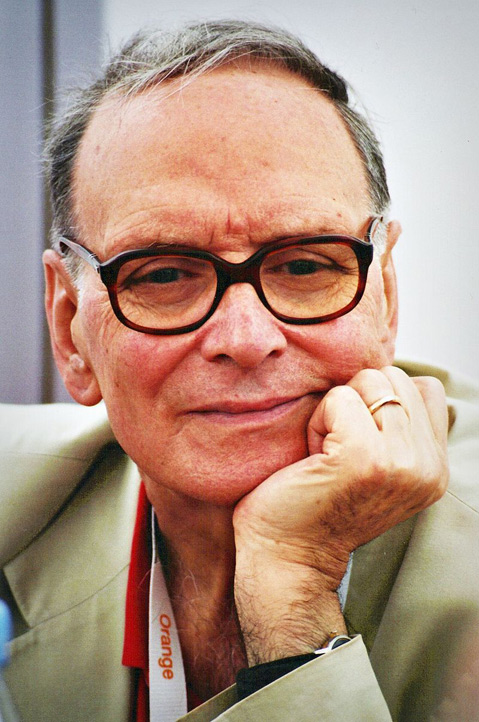Academy Awards Musical Notes
Ennio Morricone Finally Wins for Best Original Score
When the Oscar roll was called out last month, one presumably satisfying moment came when Leonardo DiCaprio “broke his spell” and joined the winner’s circle as Best Actor for The Revenant. Really, though, the award for longest-overdue statue anointment was in the film composer department: This was Ennio Morricone’s year, when one of the masters — and mavericks — of the film composition world over the past half-century, going back to his delectably weird and wonderful Sergio Leone “spaghetti western” scores of the late 1960s, won his first actual Oscar (apart from a token Lifetime Achievement award in 2007), for work on Quentin Tarantino’s The Hateful Eight.

Love the film, hate it, or shrug with indifference, but Morricone’s music is one of its high points. It is a romantic yet mischievous and still experimental feat by a creatively fiery veteran — now 87 years old — and a loving director/composer pact reminiscent of Bernard Herrmann’s riveting final score for Martin Scorsese’s Taxi Driver.
When it comes to music and the movies, especially in America, the field sometimes feels less like an art than a craft in crisis, under pressure from outside forces. Hollywood score aesthetics too often lean happily into formulaic hackwork and eschew innovation, partly connected to the limited musical knowledge or courage of directors, and the deeper matter of the general public’s fear of creative or “challenging” music.
Two of this year’s nominees are responsible for creating stylistic templates widely imitated and diluted (and demanded by directors), John Williams and Thomas Newman, while the normally inventive Carter Burwell dipped too deeply into Philip Glass’s minimalist patter for his nominated Carol score. Aside from Morricone’s grand achievement, another nominee, Icelandic composer Jóhann Jóhannsson illustrated the potential for innovation in film music with his suitably unnerving score for Sicario. Another less-noted high point in the 2015 film music picture was in The Revenant, startling music fans by including music of the French Modernist (and nature worshipper) Olivier Messiaen in its emotional thicket.
For a cinematic element of such deep importance, music has always had a strained relationship with the film medium, and its composers have had to learn compromising dance steps to work in the industry. Consider the strange fact that one of the greatest film composers, the late, great Alex North (A Streetcar Named Desire, Spartacus) earns the dubious distinction of having the most Oscar nominations (14) with nary a win. He also infamously had his scores “replaced” — for example, director Stanley Kubrick discarded North’s potent original music for 2001: A Space Odyssey in favor of classical snippets of Richard Strauss, Gyorgy Ligeti, Aram Khatchaturian, and others, as well as Sounder, subbed out to the rootsier Taj Mahal. (For a good listen, buy or Spotify the original North 2001 music, music worth hearing on its own merits. Also, check out Gergely Hubai’s fascinating book, Torn Music: Rejected Film Scores, a Selected History).
Cinema without music would be a sorry excuse for a night out, or a “liveliest art.” From a kitschier angle, a well-placed and/or winkingly irony-spiced pop song can give a scene joybuzzer moxie, as proved in two recent examples. In the anti-superhero romp Deadpool — awash in badass whimsy — my favorite moment came when that classic Chicago arena/grocery store ballad “You’re the Inspiration” looms up in the soundtrack and deconstructs into woozy time-tripping in sync with the character’s drug-addled senses. More pop-song high jinks hit screens when the dizzily uneven Whiskey Tango Foxtrot cannily coats the would-be edgy hostage-rescue scene with the cushy retro-pop swoop of Harry Nillson’s “Without You.” Hilarity ensues.
And, of course, sometimes the best music is virtually no music at all, as in this year’s stunningly powerful, controlled, and senses-seizing Best Foreign Film winner, Son of Saul. Apart from a fragment of music sung in the concentration camp, and a rueful shtetl melody on a lone violin over the end credits, the film makes its own kind of tragic, lamenting music, sans music. Silence can be a profound musical option, too.



